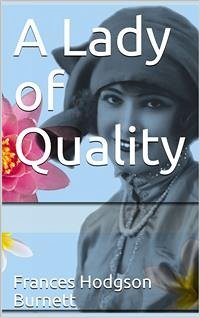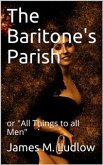Being a Most Curious, Hitherto Unknown History, as Related by Mr. Isaac Bickerstaff but Not Presented to the World of Fashion Through the Pages of The Tatler, and Now for the First Time Written Down
A Lady of Quality is a romance by Frances Hodgson Burnett, first published in 1896. If the name rings a bell, it’s because Burnett also wrote Little Lord Fauntleroy, A Little Princess, and The Secret Garden. Today Burnett is remembered for her children’s books, but she also wrote a lot of romantic novels for adults, one of which is A Lady of Quality.
It features melodrama – so much melodrama. People just don’t make melodrama like they used to.
This is a charming pastiche of the proto-novels found in early 18th century periodicals, written with only a few inevitable Victorian touches. The heroine, born in the late 17th century, is raised by her utterly disreputable father and his drunk hunting cronies; she wears boys clothes, rides like a man, and generally gets up to all sorts of mischief before determining that in order to have a comfortable future she needs to act like a woman & catch a rich husband. It's a marvelous romp; the heroine has nerves of steel and a violent temper, but enough compassion for the suffering of others that she manages to be sympathetic to the reader. The degree to which gender is treated as performative is also quite interesting, especially given the period in which the novel was written.
Hinweis: Dieser Artikel kann nur an eine deutsche Lieferadresse ausgeliefert werden.
A Lady of Quality is a romance by Frances Hodgson Burnett, first published in 1896. If the name rings a bell, it’s because Burnett also wrote Little Lord Fauntleroy, A Little Princess, and The Secret Garden. Today Burnett is remembered for her children’s books, but she also wrote a lot of romantic novels for adults, one of which is A Lady of Quality.
It features melodrama – so much melodrama. People just don’t make melodrama like they used to.
This is a charming pastiche of the proto-novels found in early 18th century periodicals, written with only a few inevitable Victorian touches. The heroine, born in the late 17th century, is raised by her utterly disreputable father and his drunk hunting cronies; she wears boys clothes, rides like a man, and generally gets up to all sorts of mischief before determining that in order to have a comfortable future she needs to act like a woman & catch a rich husband. It's a marvelous romp; the heroine has nerves of steel and a violent temper, but enough compassion for the suffering of others that she manages to be sympathetic to the reader. The degree to which gender is treated as performative is also quite interesting, especially given the period in which the novel was written.
Hinweis: Dieser Artikel kann nur an eine deutsche Lieferadresse ausgeliefert werden.









